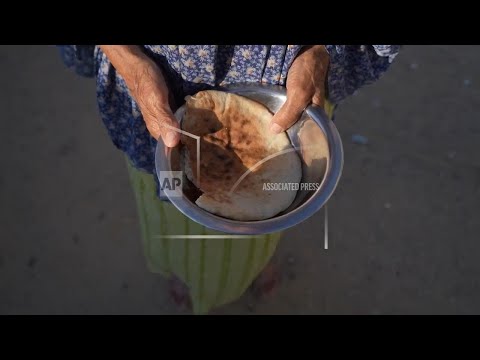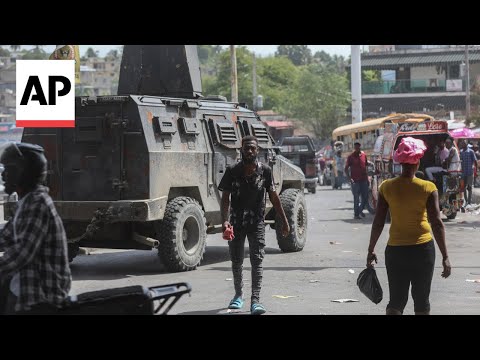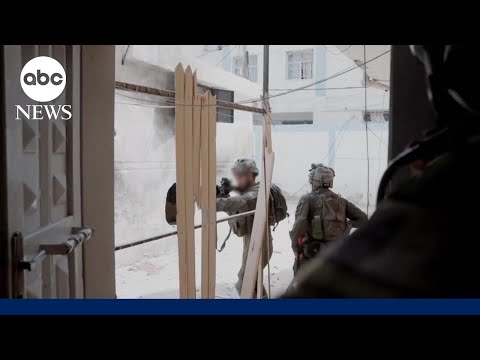(7 Aug 2025)
RESTRICTION SUMMARY:
ASSOCIATED PRESS
Deir Al-Balah, Central Gaza Strip – 4 August 2025
1. Various of Alia Hanani, 78, displaced woman from Rafah, holding plate containing loaf of bread, which is what her family shares as a single meal throughout the day
2. SOUNDBITE (Arabic) Alia Hanani, 78, displaced woman from Rafah:
“What did we eat? Each person gets a bite of bread with a little duqqa (ground legumes) once a day, at noon. There’s no dinner or breakfast.”
3. Various of Sally Muzhed, displaced woman from Deir al-Balah, holding plate containing musaka (a Palestinian dish made from eggplant and tomato juice).
4. SOUNDBITE (Arabic) Sally Muzhed, displaced woman from Deir al-Balah:
“Today we had eggplant stew for lunch. We eat this food day after day, not every day. The children remain hungry. Tomorrow we won’t have any food to eat.”
5. Various of Amani al-Nabahin, displaced woman from Bureij, holding plate containing mujaddara (a dish made from rice and lentils), which she got from a charity kitchen
6. SOUNDBITE (Arabic) Amani al-Nabahin, displaced woman from Bureij:
“Today we ate mujaddara. Here it is, from the charity kitchen. If there’s a charity kitchen, we can eat. If not, we remain hungry. I don’t have any flour or food.”
7. Various of Rehab al-Kharoubi, displaced woman from Bureij, holding plate of raw beans, which is their daily food.
8. SOUNDBITE (Arabic) Rehab al-Kharoubi, displaced woman from Bureij:
“Raw beans, I begged from people. There is no food or drink. We only drink water. No one takes pity on us.”
ASSOCIATED PRESS
Khan Younis, Southern Gaza Strip – 28 July 2025
9. Various of Kifah Qadih, displaced woman from Khuza’a, east of Khan Younis, holding empty plate as they have no food to eat during the day
10. SOUNDBITE (Arabic) Kifah Qadih, displaced woman from Khuza’a, east of Khan Younis:
"Today there is no food, there is no food available, there is nothing.”
11. Kifah holding empty plate inside her tent
STORYLINE:
Families in Gaza once dipped pieces of bread into dukkah, a condiment made of ground wheat and spices. But today, 78-year-old Alia Hanani is rationing bread by the bite, served once a day at noon, allowing each person to dip it in a wartime dukkah made of flour, lentils and bulgur.
“There’s no dinner or breakfast,” the mother of eight said.
Some Palestinians say they survive on stale, brittle pita, cans of beans eaten cold for lack of cooking gas, or whatever they can get on the days that they arrive early enough that meals remain availalble at charity kitchens.
Gas for cooking is scarce, vegetables are costly, and meat has all but vanished from the markets.
A single bowl of eggplant stewed in watery tomato juice must sustain Sally Muzhed’s family of six for the day. She calls it musaka, but it’s a pale echo of the fragrant, layered meat and vegetable dish that once filled Gaza’s kitchens with its aroma.
“The children remain hungry. Tomorrow we won’t have any food to eat,” Muzhed said from the tent where her family has been displaced in Deir al-Balah.
Once, the bowl would barely have fed one child. Now she ladles it out in spoonfuls, trying to stretch it. Her son asks why he can’t have more.
The Muzhed family’s struggle is being repeated across Gaza as the territory plunges deeper into what international experts have called “the worst-case scenario of famine.”
On some days, mothers like Amani al-Nabahin have been able to get mujaddara from charity kitchens.
Some people don’t even have enough to improvise. All Rehab al-Kharoubi has for her and her seven children is a bowl of raw white beans.
Find out more about AP Archive: http://www.aparchive.com/HowWeWork
Twitter: https://twitter.com/AP_Archive
Facebook: https://www.facebook.com/APArchives
Instagram: https://www.instagram.com/APNews/
You can license this story through AP Archive: http://www.aparchive.com/metadata/youtube/11637650ea14446f90c7498c8c042493
Author: AP Archive
Go to Source
News post in August 12, 2025, 6:04 am.
Visit Our Sponsor’s:
News Post In – News





